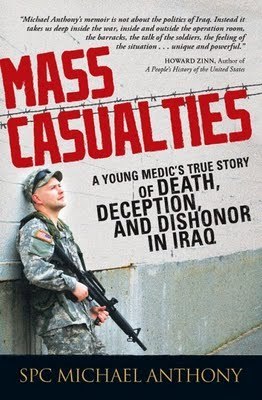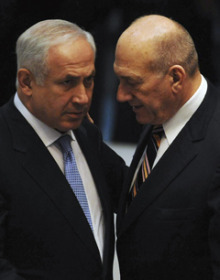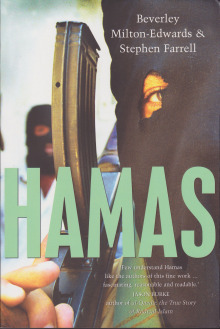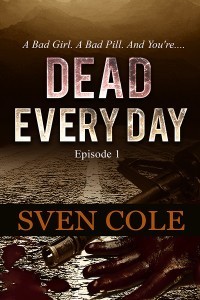Matt Rees's Blog - Posts Tagged "iraq"
The Real Iraq War: Michael Anthony’s Writing Life
 By now it’s no secret that the Iraq War has been a disillusioning experience for many of the U.S. servicemen sent there. The literature on the war has, so far, been mostly written by journalists. There’s plenty of it, and like most journalism it runs pretty mainstream and inoffensive, no matter how bloody the scenes depicted. But Michael Anthony, a veteran of the war, has a different perspective. His new book Mass Casualties: A Young Medic’s True Story of Death, Deception, and Dishonor in Iraq is the best account yet of a war that continues to cost lives and to sully the image of the democracy in whose name it was supposedly fought. It’s a subject I’ve thought about a great deal as I travel my corner of the Middle East and as I continue to encounter fighters – Israeli and Palestinian – who endure personal hardship and tormenting nightmares when they face the realities of war. So read the book. Meantime, here's Michael's Writing Life.
By now it’s no secret that the Iraq War has been a disillusioning experience for many of the U.S. servicemen sent there. The literature on the war has, so far, been mostly written by journalists. There’s plenty of it, and like most journalism it runs pretty mainstream and inoffensive, no matter how bloody the scenes depicted. But Michael Anthony, a veteran of the war, has a different perspective. His new book Mass Casualties: A Young Medic’s True Story of Death, Deception, and Dishonor in Iraq is the best account yet of a war that continues to cost lives and to sully the image of the democracy in whose name it was supposedly fought. It’s a subject I’ve thought about a great deal as I travel my corner of the Middle East and as I continue to encounter fighters – Israeli and Palestinian – who endure personal hardship and tormenting nightmares when they face the realities of war. So read the book. Meantime, here's Michael's Writing Life.How long did it take you to get published?
I started writing the book as soon as I returned home from Iraq. I wrote the first hundred pages in six months and then the last hundred pages in two days (for the first draft). I then spent several months editing and doing rewrites. In total, from starting to write until getting a book deal, it took one year (almost exactly).
Would you recommend any books on writing?
I’m sure there are some out there, but I’ve never read any books on writing. I can give you a few of my favorite books though; the ones that I place as the top tier of writing, and for me, I think reading books, with a great style and prose, can help your writing as well. My top books (not in any order): Atlas Shrugged, Catch 22, Catcher in the Rye, The Perks of Being a Wallflower.
What’s a typical writing day?
I usually spend my typical writing day, finding other things to do than write. I think part of the aspect of being a writer is having the discipline to actually sit down and write. I don’t write every day as most writers do, but when I do write, that’s all I do. For me, it’s not about quantity of time, but quality of time. I could write while doing laundry or watching television, but it wouldn’t be the same. When I do write, it’s all about the writing and nothing else, I throw myself into and sometimes I won’t shower or leave the house for days.
Plug your book. What’s it about? Why’s it so great?

My latest and first book is: Mass Casualties: A Young Medic’s True Story of Death, Deception, and Dishonor in Iraq. It is the true story of what goes on during war, and what went on over there. It’s not a pro war or anti war book, it’s simply a true war story. I think a lot of stories/movies/shows out there; paint this picture of the American Soldier as this romanticized heroic idea. What I wanted to do with my book was simply paint a picture of the American Soldier as a human. It goes back to the old saying: “I’d rather be hated for what I am, than loved for what I’m not.” If people really want to appreciate and support the troops, the least they can do is learn the real stories, and not just the ones they’re told by reporters or the military officials.
If you look at a majority of war books or movies out there, they all paint this perfect picture of war and its effects. For example, look at one of the long running war movie franchises: Rambo, starring Sylvester Stallone. Rambo goes off to war and comes home with severe post-traumatic stress disorder. Even with this PTSD, he still manages to be a hero, save a town or city from some disaster and at the end, still get the girl. But in reality, if a soldier comes home with severe PTSD, they kill themselves. End of movie, roll the credits.
The problem with romanticizing these soldiers and situations is that when they come home, no one understands what they went through and what it was really like. And because of this, today’s military has the highest suicide rates in thirty years. Since the Afghanistan war started, more active duty soldiers have killed themselves than have been injured or killed in Afghanistan—combined. This is why I think we need to give people the full picture of war, and not just the good stuff they want to know about.
Who’s the greatest stylist currently writing?
My current, favorite, contemporary writer is: Stephen Chbosky, author of: The Perks of Being a Wallflower. For me, I just loved everything about that book, from the idea of it, to the way it was written.
How much research was involved in your book?
The vast majority of my book was based on my journals in Iraq, and because of this, the research involved was minimal. All I had to do was convert my illegible sometimes chaotic journal entries, into readable prose.
What’s the best idea for marketing a book you can do yourself?
Tell everyone you know, or have ever known, and then tell them to tell everyone they know. I now think everyone in my high-school class knows I have a book in bookstores. Social Media is a great thing, and don’t be afraid to go out there and use it. Also, I think getting other authors to review and/or comment on your work. I was able to get over thirty well accomplished people to review, comment on, and endorse my work; from famous politicians, to famous historians, psychologists, veterans and authors.
How many books did you write before you were published?
When I was sixteen I had written three books and two movies; it then took me five years to realize I wanted to be a writer.
What’s your weirdest idea for a book you’ll never get to publish?
When I was younger, I once wrote a book from the perspective of a T-shirt. The book had a T-shirt as a main character and I followed him around and wrote about what he was thinking as the wearer of the shirt went around and did his daily duties.
Less about suicide bombers, more about suicides
Michael Anthony is the author of MASS CASUALTIES: A Young Medic’s True Story of Death, Deception and Dishonor in Iraq (Adams Media, October 2009). His book is drawn from his personal journals during the first year he spent serving in Iraq. You can read my interview with him here. In this guest post, he highlights an issue we all ought to give more thought.
President Obama recently stated that sending more troops into harm’s way in Afghanistan is a solemn decision—one that he would not rush. As a veteran, I find the decision to send troops into harm’s way without an effective military mental health program in place beyond solemn. It’s deeply disturbing. Keeping soldiers mentally fit should be as important as keeping them physically fit.
Since the wars in Afghanistan and Iraq started, nearly 2,000 active-service soldiers have killed themselves, according to a report by the San Antonio Express-News earlier this year. Even more alarming is the fact that every day, five active-duty service members attempt suicide. In the past eight years, that means up to 14,000 have felt their life is not worth living.
The government doesn’t want you to know this. In spring of 2008, CBS news journalist Armen Keteyian exposed a Veterans Administration cover-up of suicide stats. The reporting revealed that every day, eighteen veterans kill themselves and roughly 1,000 attempt suicide each month. The VA’s head of Mental Health had claimed there were only 790 attempts in all of 2007, a far cry from the reality.
Among all veterans, over the eight years we’ve been at war in the Middle East, the statistics point that roughly 50,000 have committed suicide, with upwards of 44,000 attempting suicide. These figures only represent data gathered since 2001; this has been an ongoing and persistent problem since Vietnam—and the numbers go up each day.
Recently, the Army made a big deal about giving $50 million to fund a five-year research project on military suicide. In their book, The Three Trillion Dollar War, Linda J. Bilmes and Nobel Prize-winning economist Joseph E. Stiglitz figured the cost of the Iraq war at $12 billion a month. That means we spend more than $16 million an hour. If you do the math, the $50 million that went to suicide research is what we spend every three hours in Iraq.
The day after Christmas this year will mark our 3,000th day at war. At this point, we’ve heard a lot about suicide bombers, but what about suicide? Regardless of anyone’s feelings about our involvement in Iraq and Afghanistan, these soldiers deserve much more than three hours of our time.
President Obama recently stated that sending more troops into harm’s way in Afghanistan is a solemn decision—one that he would not rush. As a veteran, I find the decision to send troops into harm’s way without an effective military mental health program in place beyond solemn. It’s deeply disturbing. Keeping soldiers mentally fit should be as important as keeping them physically fit.
Since the wars in Afghanistan and Iraq started, nearly 2,000 active-service soldiers have killed themselves, according to a report by the San Antonio Express-News earlier this year. Even more alarming is the fact that every day, five active-duty service members attempt suicide. In the past eight years, that means up to 14,000 have felt their life is not worth living.
The government doesn’t want you to know this. In spring of 2008, CBS news journalist Armen Keteyian exposed a Veterans Administration cover-up of suicide stats. The reporting revealed that every day, eighteen veterans kill themselves and roughly 1,000 attempt suicide each month. The VA’s head of Mental Health had claimed there were only 790 attempts in all of 2007, a far cry from the reality.
Among all veterans, over the eight years we’ve been at war in the Middle East, the statistics point that roughly 50,000 have committed suicide, with upwards of 44,000 attempting suicide. These figures only represent data gathered since 2001; this has been an ongoing and persistent problem since Vietnam—and the numbers go up each day.
Recently, the Army made a big deal about giving $50 million to fund a five-year research project on military suicide. In their book, The Three Trillion Dollar War, Linda J. Bilmes and Nobel Prize-winning economist Joseph E. Stiglitz figured the cost of the Iraq war at $12 billion a month. That means we spend more than $16 million an hour. If you do the math, the $50 million that went to suicide research is what we spend every three hours in Iraq.
The day after Christmas this year will mark our 3,000th day at war. At this point, we’ve heard a lot about suicide bombers, but what about suicide? Regardless of anyone’s feelings about our involvement in Iraq and Afghanistan, these soldiers deserve much more than three hours of our time.
Guardian: Top 10 Arab-world novels
"The Arab literary world and Western publishing don't cross over much. The literature of the Arab world is largely unknown in the west, and even westerners who write about Arabs are sometimes seen as fringe, cult writers. That comes at a cost to the west, because literature could be such an important bridge between two cultures so much at odds. What we see of the Arab world comes from news reports of war and other madness. Literature would be a much more profound contact.
"I live in Jerusalem and write fiction about the Palestinians because it's a better way to understand the reality of life in Palestine than journalism and non-fiction. The books in this list, in their different ways, unveil elements of life across the Arab world that you won't see in the newspaper or on TV."
Published on January 13, 2010 23:17
•
Tags:
abdulrahman-munif, ala-al-aswany, algeria, arab, arab-fiction, arab-novels, british-newspapers, cairo, egypt, emile-habiby, ibrahim-nasrallah, iraq, israel, kanaan-makiya, lawrence-durrell, middle-east, naguib-mahfouz, palestine, palestinians, paul-bowles, tariq-ali, the-guardian, yasmina-khadra
Bibi’s Bedtime Book: The Secret Diary of Prime Minister Netanyahu #2
 I can’t believe the extent of the corruption being uncovered in Israel’s government.
I can’t believe the extent of the corruption being uncovered in Israel’s government.My predecessor as Prime Minister drifted home from vacation yesterday – without any envelopes stuffed with cash, as far as we know -- and made a mopey statement about yet another investigation into bribery and fraud and breach of trust on his part. He’s alleged to have been in cahoots with a bunch of shady property developers, lawyers and municipal officials, so that a big, tacky building could be put up in southern Jerusalem to provide luxury dwellings for property developers and lawyers. Oh, and the former State Prosecutor, too – apparently she has an apartment there. I don’t draw any conclusions from that, though. I'm not an investigator. I just run the country.
It looks like poor old Champagne Ehud is broken by his long ordeal. Finally. He’s been brazening it out, but there are limits to the shamelessness even of an Israeli politico. If only he’d done what I did – go to the U.S., spin out some waffle about the Middle East strategic outlook, throw in a few phrases of steely determination that the Holocaust shan’t happen again (as if anyone would expect the former Israeli Prime Minister to say, ‘Well, why not? It's been a while. Let’s have another Holocaust.’), and charge them fifty grand to listen to it while they eat their shrimp. Their chicken, I mean.
Who needs corruption, when you have a public speakers’ circuit for former politicians?
By the same token, why does Tony Blair insist on keeping his job as Mideast envoy of the Quartet? It’ll take more than a skeletal smile and a familiar glottal “t” in the middle of the word “wha’ever” to extract a Nobel Peace Prize out of this place, I can tell you. What does he need such grief for? He’s one of the best paid speakers in the world (200,000 pounds for a half-hour speech, and 15 million pounds in two years since leaving Number 10.) Forget the Mideast, Tony. Creep off to the U.S. and stay there. After all, that’s the only place in the world where they think the “Prime Minister of England” is a relative of the Queen. It’s probably why they’re paying you the big money. It certainly can’t be because you were so stupid you allowed George W. Bush to fool you into going to war.
Once you’re at the top in politics, you never have to pay for dinner again. But it’s a mistake to think you don’t have to pay for your house. You just don’t have to WORK to pay for your house. A few dates in Chicago, Los Angeles, New York and Florida and I was well on the way to the cost of my villa in Caesarea. That’s what poor old Champage Ehud forgot.
That reminds me, I must send over a few Cubans to him. He's a big afficionado, but he might be running low. He’ll need them, given how much smoke he’s going to have to blow to cover all this up.
The real speaker’s fees are only for the top guys. The Prime Ministers whose reputations were soiled by Iraq, the Presidents who soiled their intern’s dress, the former US Secretaries of State who were so stupid even George W. Bush could fool them into going to war in Iraq, the …uh, the movie stars (Nicole Kidman got $435,000 to speak to a global business conference) who can teach us how to cry without having our nose-jobs run and still look fabulous.
Maybe I could look up Kidman’s speech on Youtube. I might be able to figure out how to use some of it for next year’s Holocaust Remembrance Day speech – this week at the memorials I feel I was a bit “same same,” having used up my best stuff at Auschwitz a couple of months ago. Nicole was very good in “Moulin Rouge!” Sometimes I dress as a woman and sing “One Day I’ll Fly Away” to my wife Sara, but she doesn’t seem to get the message. The messages, I mean.
Yes, speaking fees are where it’s at. Small fry have to promote themselves by writing blogs and op-eds, and even authoring their own books, as if ghost writers didn't exist. Like that writer Matt Beynon Rees. I heard that sometimes he even speaks to people for nothing, just because they want to hear him and he wants to talk about his books.
Now that’s really corrupt.
Published on April 16, 2010 06:14
•
Tags:
chicago, corruption, crime, crime-fiction, cubans, florida, george-w-bush, holocaust, iraq, israel, los-angeles, matt-beynon-rees, middle-east, moulin-rouge, netanyahu, new-york, nicole-kidman, nobel-peace-prize, olmert, one-day-i-ll-fly-away, tony-blair
Scribe and Scholar enter world of Hamas
 A New York Times correspondent teams up with a Belfast professor to write the story of Islamism among the Palestinians.
A New York Times correspondent teams up with a Belfast professor to write the story of Islamism among the Palestinians.JERUSALEM — Stephen Farrell was sipping coffee in the office of his money changer on Salah ud-Din Street, East Jerusalem’s main commercial strip, four years ago, when Beverley Milton-Edwards entered. From his rucksack, Farrell produced a copy of a book about Islamic militants written by the Queens University Belfast professor.
“Your book saved my life when I was kidnapped in Iraq,” he said, referring to a brief period of captivity by militants in Baghdad in 2004 when working for The Times of London. The dogeared volume had given London-born Farrell, now a New York Times foreign correspondent, the background he needed to convince his kidnappers that he had studied and understood their political and religious concerns. (Money may also have changed hands, of course...)
“That’s quite an endorsement,” Milton-Edwards responded. “Would you write that for the cover of my next book.”
Instead, he wrote an entire book with her. “Hamas: The Islamic Resistance Movement” (Polity Press) is the product of a decade in the Middle East for Farrell — who was kidnapped again, by the Taliban in Afghanistan, last September and freed by British commandos.
Surprisingly, given the amount of ink spilled over Hamas, it’s the first book broadly profiling the Islamic group that’s not written by an Arab or Israeli author. (GlobalPost correspondent Thanassis Cambanis may do the same for another militant group oddly neglected by Western book authors with his "A Privilege to Die: Inside Hezbollah's Legions and Their Endless War Against Israel," to be published September by Free Press.)
It’s certainly an opportune time for a history and analysis of Hamas. The group, which originated in Gaza during the first Palestinian intifada, transformed in recent years, initially killing more Israelis during the second intifada than previously would’ve been imaginable, then reversing its refusal to run in elections. Hamas won the parliamentary elections of 2006 and, in 2007, ran its rival Fatah out of the Gaza Strip, setting up the present quagmire of Palestinian politics.
I’ve known Farrell since he arrived in the Middle East for the London Times, having previously done a spell in Kosovo. He soon acquired a reputation for extreme thoroughness. On one visit to the southern Gaza Strip town of Rafah during the intifada, I ran into Farrell. He wasn’t there to cover a particular story. He said he hadn’t been busy, so he’d gone out to see what he might find. Given the volume of stories required of Jerusalem-based correspondents and the risks involved in getting to Rafah, extra-credit work such as this was rather unheard of.
“It’s very difficult to know something second-hand,” said Farrell, over coffee in a theater cafe in Jerusalem. “When you’re at the scene, things are so much more complex. That’s why you need to examine it in a book.”
Milton-Edwards provided much of the historical background that informs the book’s fascinating sections on the history of Islamism among the Palestinians before the foundation of Israel, and the activism in the 1970s of the men who would later form Hamas. But she, too, participated in much of the research on the ground, having a long-term knowledge of the place. She completed a Ph.D. on Hamas and Islamic Jihad after a media internship in Jerusalem during the first intifada.
That extensive research provides some of the most interesting snippets in the book. Hamas founder Ahmed Yassin was, in fact, an educator, not a religious leader, though he has been almost universally known as “Sheikh Yassin,” an honorific implying great Islamic learning.
The book’s historical perspective also provides surprising statistics. During the five years before the 2006 elections, Hamas had killed 400 Israelis. That’s an enormous toll, but amounts to just a couple of days work for Islamic radicals in Iraq about whom we know much less.
Written in a tone that tends closer to a plain academic style than the more trendy novelistic type of nonfiction book, “Hamas” doesn’t restrict itself to the politics and the violence. There’s a lengthy segment on the group’s approach to women — largely negative, particularly when seen through the eyes of the cosmopolitan leaders of the previous generation, like the chain-smoking Mariam Abu Dugga who wears no headscarf and used to be a member of the “Martyr Guevara” group.
Within Palestinian society, Farrell and Milton-Edwards examine Hamas’ treatment of those it considers collaborators with Israel or merely uncommitted to the Islamic lifestyle. Needless to say, it doesn’t look good.
“We don’t whitewash Hamas,” said Milton-Edwards. “We don’t ignore their cruelties.”
The more recent internal divisions within Hamas are laid out plainly and in a detail not found elsewhere. The book looks at the still burgeoning conflict between the group’s original leadership — no blushing softies, after all — and a new generation of military leaders in Gaza in particular which wants Hamas to adopt a “salafi” line akin to the even more uncompromising Islamists produced by the Gulf states. The less-than-encouraging news is that in the last year the “salafist” wing of Hamas has taken the upper hand over the relative moderates.
Behind all this Farrell and Milton-Edwards identify a failure of leadership on the part of Hamas and its Fatah rivals that’s summed up by Hanan Ashrawi, a former Palestinian peace negotiator quoted in the book: “Hamas had to learn very quickly how to be in power and Fatah has to learn how to be out of power. Both of them haven’t learned, really. Fatah is not used to being in opposition, it doesn’t know how to, and Hamas is not used to being in government, and it behaved like an opposition.”
(I posted this on Global Post. Read more of my dispatches.)
Published on April 25, 2010 02:00
•
Tags:
afghanistan, baghdad, belfast, beverley-milton-edwards, books, fatah, gaza, hamas, hanan-ashrawi, hezbollah, intifada, iraq, islam, jerusalem, middle-east, new-york-times, palestine, palestinians, polity-press, queens-university-belfast, reviews, sheikh-yassin, stephen-farrell, taliban, terrorism, thanassis-cambanis
Writing Tip #93: Walking and plotting
 Readers like to ask writers “Where do you get your ideas?” It’s such a common question at book readings that I’ve noticed writers (on blogs) making fun of people who ask it. Yet it’s rather silly to ridicule someone for asking a question most writers can’t answer themselves.
Readers like to ask writers “Where do you get your ideas?” It’s such a common question at book readings that I’ve noticed writers (on blogs) making fun of people who ask it. Yet it’s rather silly to ridicule someone for asking a question most writers can’t answer themselves.So here’s my answer: I get my best ideas by walking.
Just lately I’ve been plotting my next book, which is going to be a thriller set in Iraq and New York. I’ve done a good deal of thinking about it in my office, standing in front of my computer or slouched in my bean bag. But when I’m in front of the computer, I find myself thinking about what to write for this blog. And on the bean bag I get distracted by the little white polystyrene balls which seem endlessly to leak out of it onto my Iranian kilim.
The best ideas for this new novel have come to me as I walk home from the gym. It’s not because I’m walking through the prettiest part of town. I walk along a busy dual-carriageway linking two other noisy, busy roads. I sweat like a pig, too – I remind you that I live in Jerusalem, which is a mountainous desert town.
But all the way I’m chattering into my digital voice recorder, setting down my ideas. The reason is simple: relaxation and lack of distraction. I have nothing else to do but walk. Nowhere to go but where I’m going. Nothing to see but fast-moving traffic and a deserted sand lot. My mind is free to be creative, because it’s unhindered by anything else. (I’m quite capable of walking and doing something else at the same time, fortunately.)
In my meditation classes, I’ve sometimes practiced a walking meditation. If you pay attention to each step, the way your foot falls, you’ll soon find your mind entirely clear of any distraction. The same thing is happening on my way home from the gym.
Read the rest of this post on my blog The Man of Twists and Turns.
Published on June 30, 2011 09:18
•
Tags:
ideas, iraq, meditation, new-york, plots, thriller, walking-meditation, writing, writing-tips
Great new thriller DEAD EVERY DAY Episode 1 out today
A great new thriller out today in episode form:

The shocking first episode of DEAD EVERY DAY: An Ellis Callan Thriller is out now. Download the US edition or get the UK edition
or get the UK edition .
.
Military historian Ellis Callan heads out on patrol in Baghdad to gather material for his oral history of the war in Iraq. The patrol goes badly wrong. Callan is left with guilt for the comrades and civilians he believes he should've saved. He turns to his sister, a psychiatrist. He takes an experimental pill for post-traumatic stress disorder. Then things get weird...
The second and third episodes of the novel will be out weekly.

The shocking first episode of DEAD EVERY DAY: An Ellis Callan Thriller is out now. Download the US edition
Military historian Ellis Callan heads out on patrol in Baghdad to gather material for his oral history of the war in Iraq. The patrol goes badly wrong. Callan is left with guilt for the comrades and civilians he believes he should've saved. He turns to his sister, a psychiatrist. He takes an experimental pill for post-traumatic stress disorder. Then things get weird...
The second and third episodes of the novel will be out weekly.
Published on January 29, 2014 01:24
•
Tags:
baghdad, iraq, military-thriller, new-release, new-york, psychological-thriller, ptsd, suspense, thriller



